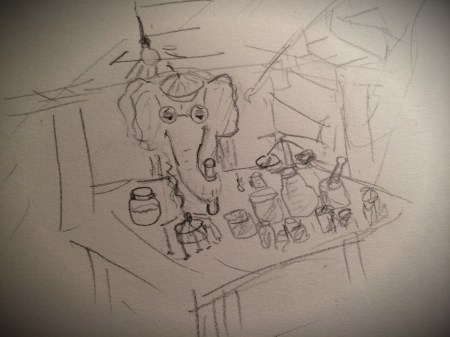[WARNING– OVERLY LONG POEM AHEAD}
Not Nightingale
When I was little, I read biography–
for the young seek heroes–books about women
especially–a hagiography
of possibilities, of those who were bent
like me, who might too have been raised to please.
There was an astronomer from Nantucket–
no joke–Maria Mitchell–and so I squeezed
a telescope out of Christmas, and stuck it
on our front sidewalk, trying for satellites.
Then Clara Barton, Edith Cavell–not
Florence Nightingale–except to the extent
that any nurse from a then-past war seemed a lot
like Florence Nightingale, and was subject
to confusion with her, none having a name
so apt–itself a balm, a cool compress–
Florence–on a bandaged head–and for the lame.
the grievous–Nightingale–a wing. But the book
on Cavell was favorite, its cover dark
and lamplit, a woman cloaked in the look
of the secret and stalwart—nothing of the lark,
no, the nightingale, disguised perhaps as wren,
swallow–I know I read it thoroughly
and, on a trip to Brussels, searched on end
for Cavell’s alleged statue, but found only,
with my folks, the little peeing boy–
urinal fountain–I pretended to laugh
but stared hard. (I was eight.) But what so
amazes me is that yesterday, years past
my crush on Cavell, I first read of her death
in front of a German firing squad.
World War I. How in the world had that left
me blank? My aging brain’s mockingbird
crows that I must have forgotten, but how
forget her last night’s words–”Patriotism
is not enough. I must have no
hatred or bitterness towards anyone.”
Surely, my young mind would have clung to her
figure backed against a wall, would have looked
at that imagined stance from every angle;
Could I really let that go? Or did the book
protect me, a young reader, undoubtedly
female, offering only episodic
Cavell? And, if so– if so– what else in me,
my learned-scape, has been bowdlerized, picked
over? I need, I tell myself, to learn more.
About everything. I don’t want mown
facts, trimmed truths==let me read myself sore,
and those gaps that I still hide–let them be sown–
And let me remember what’s read–if I can’t,
let me read it again, re-catching light
from page and vow to illuminate the slant
of now, telescoping (better) the bright
flares that have lit so many dark trails,
but also, the dimmer lamps, for we old
seek heroes too; and though I love Nightingales,
brave Cavells, though I too would love to be bold–
those who simply have no hatred, bitterness
also fit a pantheon, their song,
whether caroled by day or night no less
sweet–something (while reading) to sing along.
*****************************
Agh! This is an absolute torturous draft poem for Susie Clevenger’s prompt on With Real Toads to write about a nightingale. Edith Cavell was a British nurse who, when working in German occupied Belgium during World War I, nursed both allied and German soldiers, and helped some allied soldiers to escape. She was tried and sentenced to death and, though many diplomatic efforts were made to save her, was shot by a German firing squad on October 12, 1915.











Recent Comments